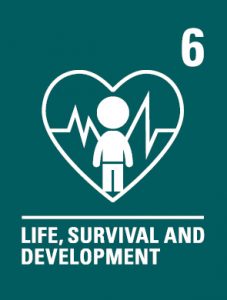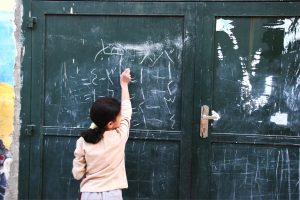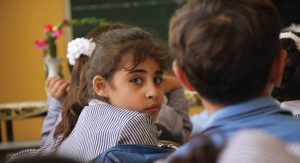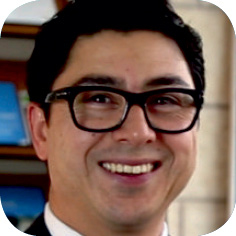 Girls’ education is at a juncture of two of the most important challenges of our time: education and gender equality. A collective consciousness is rising to ensure that the right to quality education for all girls becomes a reality. The challenges are still immense. Worldwide today, more than 132 million girls are still out of school, and 9 million of them – compared to 3 million boys – will never even enter a classroom. In addition, of the 600 million adolescent girls who will enter the labor market in the next decade, more than 90 percent live in developing countries and will work in an informal economy where unpaid work, abuse, and exploitation are more prevalent.
Girls’ education is at a juncture of two of the most important challenges of our time: education and gender equality. A collective consciousness is rising to ensure that the right to quality education for all girls becomes a reality. The challenges are still immense. Worldwide today, more than 132 million girls are still out of school, and 9 million of them – compared to 3 million boys – will never even enter a classroom. In addition, of the 600 million adolescent girls who will enter the labor market in the next decade, more than 90 percent live in developing countries and will work in an informal economy where unpaid work, abuse, and exploitation are more prevalent.
Gender equality is a global priority for UNESCO, and the support of young girls, their training and their full ability to make their voices and ideas heard are drivers for sustainable development and peace. In too many cases across the globe, teenage girls drop out of school due to forced marriages or child labor. UNESCO is committed to ensuring that all girls have access to quality education and a dignified life. In Palestine, girls in particular are at high risk of school dropout due to security concerns and the parent’s fear of their children’s safety during the school commute.i The presence of checkpoints and travel by public transport raise security and socio-cultural concerns experienced by girls and their parents, especially in Area C.ii These challenges that Palestinian children face in order to access quality education affect their learning outcomes and may lead to increased school dropout and a greater likelihood to indulge in risky behavior. Palestinian girls who drop out of school are among the most vulnerable, since they tend to score lower for psychosocial well-being due to social isolation. Women and girls with disabilities face particular challenges, as schools are not suitable or adapted to their needs, which further prevents their access to education.*3

Adolescent girls have the right to a safe, educated, and healthy life, not only during these critical formative years but also as they mature into women. If effectively supported during the adolescent years, girls have the potential to change the world – both as the empowered girls of today and as tomorrow’s workers, entrepreneurs, mentors, household heads, political leaders, and mothers. An investment in realizing the power of adolescent girls upholds their rights today and promises a more equitable and prosperous future, one in which half of humanity is an equal partner in solving the problems of climate change, political conflict, economic growth, disease prevention, and global sustainability.
Too many girls and women are still held back by social norms and traditional school practices that impact their educational rights and opportunities. For example, in Palestine women are excluded from a number of professions, as vocational courses are often considered “masculine jobs” and unavailable to girls. In addition, social norms and expectations about what is an appropriate profession for a woman further contribute to this development.*4 Despite the challenges, education in Palestine, especially for girls and women, is one of the most important investments that the country can make for its future.

Palestinian women are among the most educated in the Middle East. According to the UNESCO Institute of Statistics (UIS), the literacy rate of women in Palestine aged 15 years and older is 96 percent.*5 Girls are equally represented in STEM (science, technology, engineering, and mathematics) alongside boys, and their presence in universities continues to grow. Palestinian girls consistently outscore their male peers in the General Secondary Exam, and more women than men are enrolled in university.*6
On International Day of the Girl Child (October 11, 2019), UNESCO continued to highlight the role of education in empowering girls to be a force for lasting change. We celebrated the #GirlForce: champions who are working to empower girls and women to reach their full potential and the girls who, through education, have managed to walk past gender norms and bias to follow their dreams.
“Her Education, Our Future” is UNESCO’s drive to accelerate action for girls and women’s education by leveraging political and financial commitments, as well as leadership for women and girls. It will contribute to the UNESCO Strategy for Gender Equality in and through Education (2019–2025) and its three pillars, aiming for better data to inform action for gender equality in and through education; better legal, policy, and planning frameworks to advance rights; and better-quality learning opportunities to empower.
All over the world, UNESCO, as the lead agency of the SDG4 Agenda, is dedicated to ensuring that girls’ access to education is free of charge. UNESCO is committed to advocating for gender equality in education and to addressing all aspects that impede girls’ freedom and that constitute barriers to their intellectual formation and social and professional integration.

i UN Hebron Strategy, 2016, https://unsco.unmissions.org/sites/default/files/joint_un_strategy_for_hebron.pdf.
ii Education Cluster and Child Protection Working Group (CPWG) Mapping Exercise 2015.
iii Humanitarian Needs Overview 2019: https://www.ochaopt.org/sites/default/files/humanitarian_needs_overview_2019.pdf.
iv UNCT, Common Country Analysis for Palestine, 2016, https://unsco.unmissions.org/sites/default/files/cca_report_en.pdf.
v UIS, http://uis.unesco.org/en/country/ps?theme=education-and-literacy.
vi Ministry of Education, Education Sector Strategic Plan 2017–2022.


